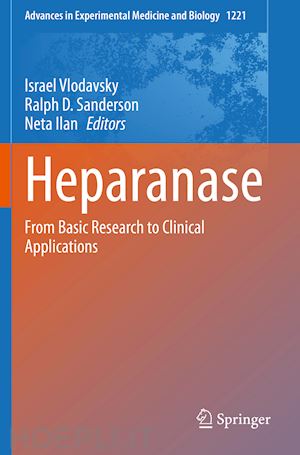
Questo prodotto usufruisce delle SPEDIZIONI GRATIS
selezionando l'opzione Corriere Veloce in fase di ordine.
Pagabile anche con Carta della cultura giovani e del merito, 18App Bonus Cultura e Carta del Docente
Written by internationally recognized leaders in Heparanase biology, the book’s eight chapters offer an opportunity for scientists, clinicians and advanced students in cell biology, tumor biology and oncology to obtain a comprehensive understanding of Heparanase’s multifaceted activities in cancer, inflammation, diabetes and other diseases, as well as its related clinical applications.
Proteases and their involvement in cancer progression have been well addressed and documented; however, the emerging premise presented within this book is that Heparanase is a master regulator of aggressive cancer phenotypes and crosstalk with the tumor microenvironment. This endoglycosidase contributes to tumor-mediated remodeling of the extracellular matrix and cell surfaces, augmenting the bioavailability of pro-tumorigenic and pro-inflammatory growth factors and cytokines that are bound to Heparan sulfate. Compelling evidence ties Heparanase with all steps of tumor progression including tumor initiation, growth, angiogenesis, metastasis, and chemoresistance, supporting the notion that Heparanase is an important contributor to the poor outcome of cancer patients and a validated target for therapy. Unlike Heparanase, heparanase-2, a close homolog of Heparanase, lacks enzymatic activity, inhibits Heparanase, and regulates selected genes that promote normal differentiation and tumor suppression. Written by internationally recognized leaders in Heparanase biology, this volume presents a comprehensive understanding of Heparanase’s multifaceted activities in cancer, inflammation, diabetes and other diseases, as well as its related clinical applications to scientists, clinicians and advanced students in cell biology, tumor biology and oncology.
Historical background
1. Mast cell/platelet heparanase/Heparan sulfate biosynthesis and turnover
2. Gene cloning/overview
3. Gene cloning/melanoma metastasis
4. Gene cloning/cancer/immune system
5. Heparin/HS modifying enzymes
Crystal structure/substrate specificity/gene regulation
6. Crystal structure
7. Molecular dynamics, KKDC peptide
8. Biochemistry/active site
9. Substrate specificity
10.Gene regulation, promoter/Egr1/methylation
11. SNPs - polymorphism
12. Splice variants
Cell & tumor biology (general functions & mode of action)
13 Exosomes/heparan sulfate/heparanase
14. Exosomes/drug resistance
15. Nuclear heparanase/transcriptional activity
16. Non-enzymatic functions/signal transduction/cellular trafficking/autophagy
17. Heparan sulfate/stem cells/inflammation
18. Danger signals/HS/platelet heparanase
19. Heparanase/integrins/melanoma
Immune cells/immuno-modulation
20. Heparin, heparanase & selectins in cancer metastasis and inflammation
21Trans-endithelial migration, lymphocytes/neutrophils/t-cells
22 Macrophages/ dendritic cells/autoimmunity
23. Macrophages, Heparanase and the tumor microenvironment, neutralizing antibodies24. NK cells
Cancer (heparanase in specic types of cancer)
25. Myeloma/inhibition/drug resistance
26. Breast cancer/pancreatic cancer/Cancer & Inflammation
27 Brain metastasis/mir-1258
28. Gastric cancer/immunization
29. Head & Neck
30. Glioma
31.Sarcoma
Inhibitors/clinical trials/cancer
32. Chemistry/synthesis of heparanase inhibitors PI-88, PG
33. PG series; biology. Tumor models & clinical trial
34 Chemically modified heparins/ Heparin mimetics
35. Roneparstat/small molecules/clinical trials
Other indications/diseases
36.IBD/inflammation & cancer/diabetes/obesity
37 immune diabetes
38. Inflammation, Sepsis/Amyloidosis
39. Kidney dysfunction
40. Fibrosis
41. Viral infection
42. Cariomyocytes/ Endothelial cell-cardiomyocyte crosstalk in diabetic cardiomyopathy
43. Eye research
44. Atherosclerosis, nuclear localization
45. Coagulation/tissue factor
Heparanase-2 (Hpa2)
46. Hpa2 gene cloning
47. UFS - urofacial syndrome; peripheral neuropathy
48. Hpa2: tumor suppressor











Il sito utilizza cookie ed altri strumenti di tracciamento che raccolgono informazioni dal dispositivo dell’utente. Oltre ai cookie tecnici ed analitici aggregati, strettamente necessari per il funzionamento di questo sito web, previo consenso dell’utente possono essere installati cookie di profilazione e marketing e cookie dei social media. Cliccando su “Accetto tutti i cookie” saranno attivate tutte le categorie di cookie. Per accettare solo deterninate categorie di cookie, cliccare invece su “Impostazioni cookie”. Chiudendo il banner o continuando a navigare saranno installati solo cookie tecnici. Per maggiori dettagli, consultare la Cookie Policy.